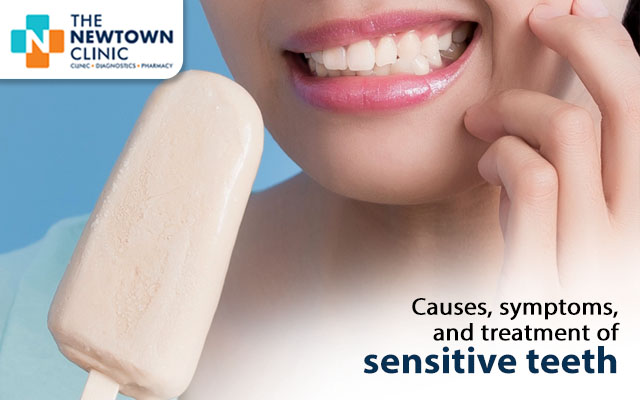When you have tooth sensitivity, you might experience difficulty while eating, drinking, or brushing your teeth. Learn its causes, symptoms, and treatment from a dental surgeon in Newtown.
Causes
According to doctors from the best dental clinic in Rajarhat, some people have sensitive teeth because of thin enamel. However, the enamel can also get worn down due to the following reasons.
1. Brushing the teeth hard
2. Grinding of teeth
3. Drinking or eating acidic beverages and food
Other factors that can contribute to tooth sensitivity are as follows.
1. Gum recession – Gum recession can leave parts of the tooth exposed, which can cause tooth sensitivity.
2. Tooth decay and other dental problems – If you have tooth decay, broken, chipped teeth, and worn-down fillings and crowns, it can expose the dentin of your tooth, resulting in sensitivity. In this case, you will only feel this sensitivity in one particular region of your teeth.
3. Dental treatments – You might develop temporary tooth sensitivity if you get dental treatments such as teeth bleaching, fillings, and crowns. Sensitivity will only be confined to a single tooth or the surrounding teeth that had the dental work done in such cases. It will usually subside by itself after a few days.
4. Gastroesophageal reflux – This condition causes acid to come up from your stomach and oesophagus to the mouth, which might wear down your teeth over time, causing sensitivity.
Symptoms
As per the best dental doctor in Newtown, you might experience the following symptoms if you have tooth sensitivity.
1. Sensitivity to variations in temperature
2. Pain and discomfort while having hot or cold beverages and food
3. Pain during flossing or brushing teeth
4. Sensitivity to sweet and acidic food and drinks
Treatment
In case you have mild tooth sensitivity, your dental surgeon will suggest over-the-counter dental treatments. For instance, they might recommend toothpaste that is specifically made for sensitive teeth. These toothpastes have desensitizing ingredients that block discomfort arising from the nerves.
In case you use a mouthwash, your dentist will ask you to use an alcohol-free wash, as it is less irritable for your teeth. Moreover, using a toothbrush with soft bristles can help you manage your tooth sensitivity.
Usually, these treatments show effective results within a week of putting them into application. If required, your dentist might even suggest prescription desensitizing agents or fluoride gel. This will help strengthen your enamel and safeguard your teeth.
We have discussed the causes, symptoms, and treatment of sensitive teeth. Reach out to the best dental doctors to know more treatment options for your tooth sensitivity.

